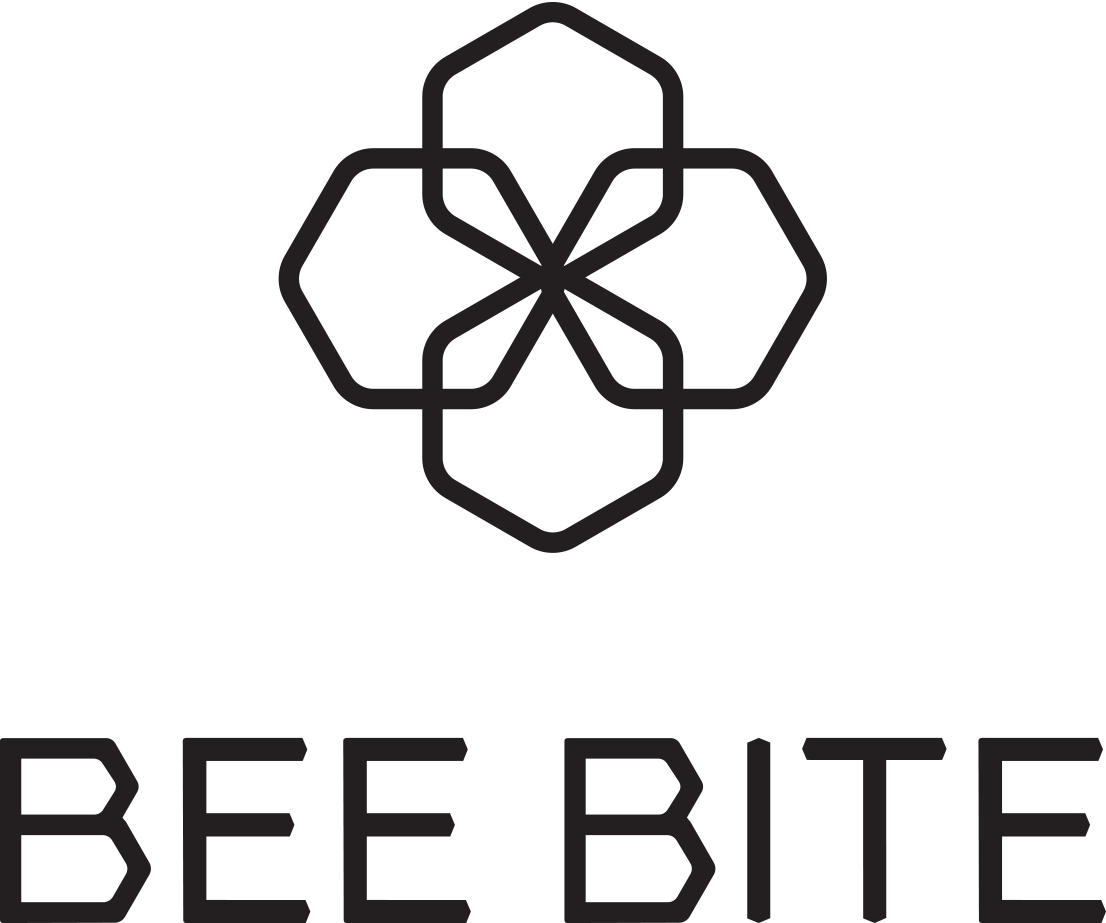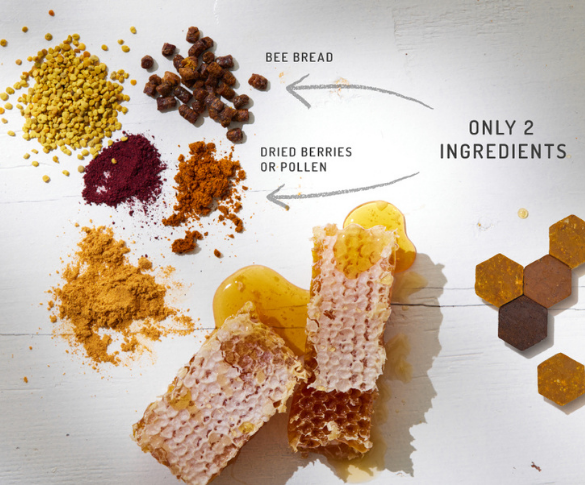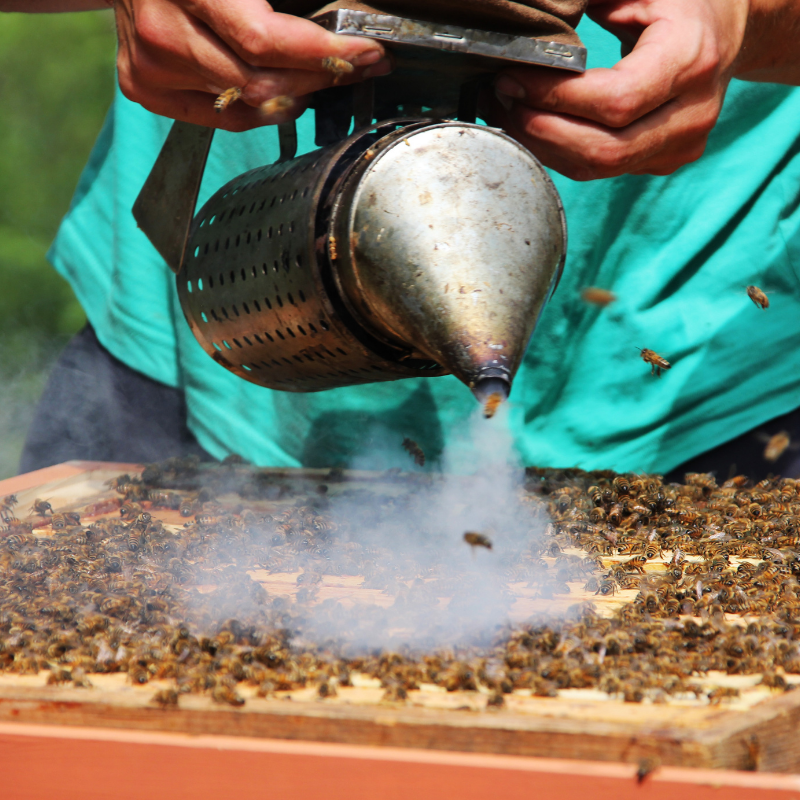CERTIFIED NUTRITIONIST GUNA BĪLANDE ON BEE BREAD AND WHY WE SHOULD USE IT
In our busy and fast-paced daily routine it is important to keep track of what we eat, so that we can get enough vitamins, minerals, as well as other necessary nutrients. But no matter how we try to receive all the necessary substances through food, it is often simply not possible, therefore we have to use some vitamin complex or dietary supplement in addition.

However, this does not necessarily mean that we have to go straight to the pharmacy – certainly not. Many vitamins, micro and macro elements and the valuable omega fatty acids we really need can be received with the help of various dietary supplements or so-called superfoods, which are often more natural than pharmacy products. Among such especially valuable products, obtained in Latvia, I would like to highlight bee bread, which in its essence is a nature-made vitamin complex, containing 240 to 380 active substances.
What is bee bread exactly and why should we use it?
Simply put, bee bread is fermented pollen. In the process of fermentation, naturally occurring compounds, such as proteins, are broken down into simpler compounds – amino acids, which are more easily absorbed by the body. Amino acids in turn are the raw material for the formation of protein, tissue and cells.
Different combinations of 28 amino acid compounds make up 50 000 proteins and 20 000 tissues in our body. If the body lacks just one amino acid, the relevant protein is not formed. In addition, the normal functioning of the body requires 9 irreplaceable amino acids, all of which are found in bee bread. They are irreplaceable because the human body does not produce these amino acids itself, therefore we receive them through food.
Bee bread contains a great variety of vitamins, such as vitamin A, B1, B2, B3, B6, C, E, D, K, PP, H, etc. As they are naturally produced, unlike synthetically produced vitamins, the body is able to consume them fully.
Bee bread also contains iron, magnesium, calcium, potassium, manganese, as well as many other micro and macro elements.
If calculated in proportion, bee bread contains more protein than, for example, meat, fish, milk. It contains high amounts of unsaturated fatty acids omega-3 and omega-6, omega-9, which are essential for the normal functioning of the human nervous system, but for children are very important for brain development.
Another such naturally occurring “vitamin complex” is practically non-existent. Bees use bee bread for the development of the colony (young bees) in the spring period, which means that bee bread contains all the nutrients for bees to grow and develop to their full potential. As the stomach of the bee is similar to the human stomach in some ways, the nutrients in bee bread can also be perfectly used by humans.
But what are the benefits of all these nutrients to the human body?
What benefits does bee bread provide to health?
Bee bread is good for the heart, eyesight, the digestive system and immunity. It should be used to protect yourself from the common cold, to boost immunity, to reduce fatigue and to restore strength after physical and mental exertion, as well as to slow down the ageing process. It improves memory, stimulates working capacity and activates thinking, improves eyesight.
Bee bread is recommended for rehabilitation of the body after the use of antibiotics, as it restores microflora in the stomach and the intestines.
Bee bread is especially popular among vegetarians and raw foodists, who admit it is a great way to take in much needed micronutrients, macronutrients, omega fatty acids and amino acids.
What is BEE BITE and why should you choose it?

BEE BITE are chewable pastilles containing 100% natural bee bread harvested in Latvia. The BEE BITE team has given bee bread a new shape, as well as particularly convenient packaging, so that it is easy for everyone to use in today’s fast rhythm. They are the only bee bread pastilles in Latvia approved for use by the Food and Veterinary Service.
The uniqueness of Bee Bread lies in its varied composition, which is why BEE BITE products are completely unaltered and 100% natural.
Those who eat BEE BITE especially favour the pastilles with natural berry powders made in Latvia, which add extra vitamins to the product, as well as mask the bitter taste that not everyone prefers.
The key benefits of BEE BITE:
- Easy-to-use format and packaging – the daily dose is packed in a sachet that allows you to take the pastille along in your handbag, sports bag, car, or to give it to your child for taking to school or training.
- Accurately proportioned daily dose. One daily dose in the package. Unprocessed bee bread is picked from a jar using a spoon, which is quite awkward and the dose is not clear. Such use is especially complicated for children.
- Flavoured bee bread – berry supplements of berries picked and dried in Latvia add extra dietary fibre and vitamins, mostly vitamin C, as well as improve the taste, which makes it tastier for children or those who don’t like regular bee bread. The offer includes bee bread with black currant, lingonberry, sea buckthorn, apple/cinnamon flavours, but the black currant and apple/cinnamon flavours are the most popular. The product contains bee bread and natural dried berry or apple and cinnamon additives only, no other binding agents are used, thus the product remains 100% natural.
- Convenient accessibility, as you can buy it from the online store, as well as in health food stores around Latvia.
- High quality ingredients, as BeeBite products are made from self-harvested bee bread that is tested.
Bee bread – local underestimated superfood
Certified Nutritionist Guna Bīlande, Studio “ReCure”
We all want to remain young, beautiful, full of energy and healthy, so the elixir of eternal youth, ragweed and other super-ingredients have been sought for a long time. Although it often seems that the miracle solutions from overseas have much more positive potential, it turns out that the true values can be found right here next to us and have been known for years. You could say, everything new is in fact the well-forgotten old. This is exactly how bee bread can be characterised.
One of the daily goals is to receive all the nutrients the body needs, but nowadays we do not always succeed in this due to our fast paced lives and, as we have to admit, also due to the intensive cultivation methods that result in products of poor nutritional value. Thus additional help is sought and in such cases bee bread can be used. It is virtually impossible to mimic or imitate nature and its unique products in laboratories, therefore so far scientists have failed at any attempts to produce something equivalent.
Bee bread is a mixture of pollen, honey and enzymes, that bees store in cells.
 Bees seal the cells of bee bread in the same way as honey cells, by using wax, and then in the presence of lactic acid bacteria and the warm temperature in the hive during the summer months, the fermentation process begins, which is very similar to the formation of yoghurt or sauerkraut. Fermentation is what gives the bee bread its slightly sour taste.
Bees seal the cells of bee bread in the same way as honey cells, by using wax, and then in the presence of lactic acid bacteria and the warm temperature in the hive during the summer months, the fermentation process begins, which is very similar to the formation of yoghurt or sauerkraut. Fermentation is what gives the bee bread its slightly sour taste.
Of all the products found in bee hives, bee bread seems to be the least used. But undeservedly, because it is called bread for a reason, as the composition and biological value of bee bread is impressive.
As bee bread is made of pollen and honey mixed with bee saliva and the enzymes they contain, the composition of both is similar, but bee bread has up to 3 times greater nutritional value and antimicrobial effect. Studies have shown that bee bread contains more simple sugars, but low glycemic index, more vitamins (A, B, C, E and K), enzymes, minerals (sodium, potassium, phosphorus, zinc, magnesium, calcium, iron, selenium) and amino acids, and besides bee bread contains more amino acids than pollen does. Bee bread also contains large amounts of flavonoids (derivatives of quercetin, kaempferol, myricetin, isorhamnetin and herbacetin glycosides) and the unsaturated fatty acids that the body requires. All this also explains the anti-oxidative, anti-inflammatory, anti-tumour, antiallergic and neuroprotective properties of bee bread. There is less protein in bee bread than in pollen, but this is consequently due to bee enzymes, which are also active in the fermentation process, resulting in part of the protein already being broken down into amino acids, which means easier absorption and better digestibility.
During their flight bees actually look for two things – nectar and pollen.
 As we know bees make honey from nectar, but as it turns out, the pollen itself is not eaten at all, because it is surrounded by an invisible double cellulose shell. Bee bread is fermented by bees, because it is exactly the fermentation process that breaks down this shell, making bee bread a product with much higher bioavailability, or simply put – the body is able to absorb and utilise the valuable substances much better.
As we know bees make honey from nectar, but as it turns out, the pollen itself is not eaten at all, because it is surrounded by an invisible double cellulose shell. Bee bread is fermented by bees, because it is exactly the fermentation process that breaks down this shell, making bee bread a product with much higher bioavailability, or simply put – the body is able to absorb and utilise the valuable substances much better.
Fresh pollen has a relatively short shelf life and it goes bad quickly, if not dried or frozen, therefore bees have been smart enough to learn how to ferment pollen for storing it. After about 3 months of fermentation a brown product, known as bee bread, is obtained. Bee bread in its essence is preserved pollen, which the bees use as a source of protein for their colony. It is similar to how humans make sauerkraut from cabbage or ferment yogurt. This product is a good source of amino acids, vitamins, macro and micronutrients. It should be noted that while pollen and honey may be allergenic products, bee bread, as an already fermented product, is less likely to cause allergic reactions.
Bee bread is an apitherapeutic product (therapeutic product created by bees) recommended for people with digestive and liver problems, as it helps to improve liver function and thus cleanse the body. This product is recommended for people with high cholesterol levels or atherosclerosis, as well as urinary tract and prostate problems. Studies have shown a number of potential benefits of using bee bread, such as antifungal, antimicrobial, antiviral, anti-inflammatory, hepatoprotective, anticancer immunostimulatory and local anaesthetic agent. Bee bread may also be useful in cases of cardiovascular diseases and anaemia.
Although studies have been conducted in laboratories, where mice were fed only bee bread, and even after a few months they did not show any signs of nutrient deficiency, the normal, balanced daily diet should not be replaced by bee bread. The recommended daily amount is 5-10 grams, and even less for children.
BE HEALTHY!









